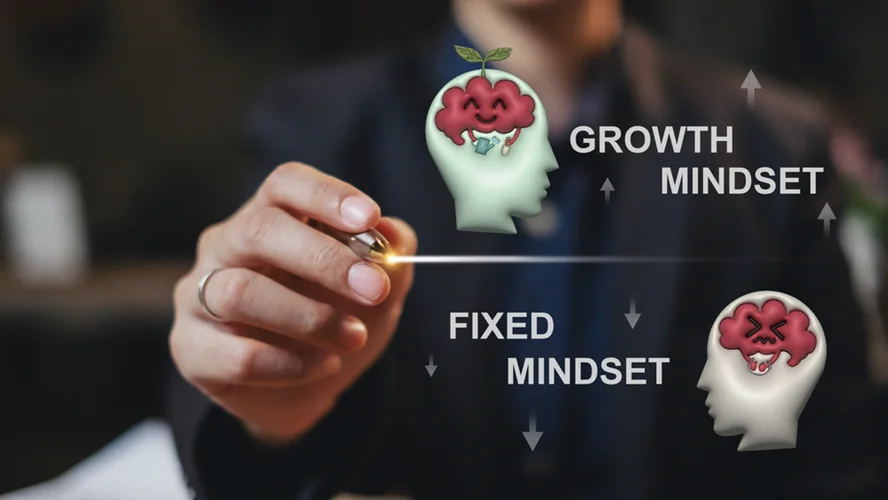The Benefits of a Growth Mindset in Digital Marketing
Understanding a Growth Mindset
A growth mindset is the belief that abilities and intelligence can be developed over time. This concept, introduced by psychologist Carol Dweck, contrasts with a fixed mindset, which assumes that talent and intelligence are innate and unchangeable. In digital marketing, a growth mindset fosters innovation, resilience, and adaptability. Marketers with a growth mindset view challenges as opportunities to learn and grow. They are willing to experiment, take risks, and learn from their mistakes. This mindset encourages continuous learning and improvement, which are essential in the fast-paced world of digital marketing. According to a study by Harvard Business Review, companies with a growth mindset culture are 34% more likely to achieve long-term financial success. By adopting a growth mindset, digital marketers can stay ahead of industry trends, adapt to changes, and drive better results for their campaigns.
Encouraging Innovation and Creativity
A growth mindset in digital marketing fosters innovation and creativity. Marketers with this mindset are not afraid to explore new ideas and experiment with different strategies. They understand that failure is a part of the learning process and use it as a stepping stone to success. This openness to new ideas leads to innovative marketing campaigns that capture the audience’s attention and drive engagement. In a rapidly evolving digital landscape, creativity is crucial for standing out from the competition. Marketers who embrace a growth mindset are more likely to think outside the box and develop unique campaigns that resonate with their target audience. According to a study by Adobe, companies that foster creativity achieve 1.5 times higher market share and 2.2 times higher revenue growth. By promoting a growth mindset, digital marketers can unlock their creative potential and create impactful marketing campaigns.
Adapting to Industry Changes
The digital marketing landscape is constantly changing, with new technologies, platforms, and trends emerging regularly. A growth mindset enables marketers to adapt to these changes and stay relevant. Marketers with a growth mindset are open to learning and embrace new tools and technologies. They proactively seek out new opportunities to enhance their skills and knowledge. This adaptability is crucial for staying ahead of the competition and delivering effective marketing campaigns. For example, the rise of social media platforms and influencer marketing has transformed the way brands connect with their audience. Marketers who embrace a growth mindset can quickly adapt to these changes and leverage new opportunities to engage with their target audience. According to a report by LinkedIn, 94% of marketers believe that they need to continuously learn and adapt to stay successful in their roles. By adopting a growth mindset, digital marketers can navigate industry changes with confidence and drive better results.
Enhancing Problem-Solving Skills
A growth mindset enhances problem-solving skills in digital marketing. Marketers with this mindset view challenges as opportunities to develop new solutions and improve their strategies. They are more likely to experiment with different approaches and learn from their experiences. This willingness to explore new ideas leads to more effective and innovative solutions to marketing challenges. In digital marketing, problem-solving is essential for optimizing campaigns and achieving better results. For example, marketers may face challenges such as low engagement rates or high customer acquisition costs. By adopting a growth mindset, they can analyze data, identify areas for improvement, and develop new strategies to address these challenges. According to a study by McKinsey, companies with strong problem-solving capabilities are 2.9 times more likely to outperform their competitors. By promoting a growth mindset, digital marketers can enhance their problem-solving skills and drive better outcomes for their campaigns.

Building Resilience and Persistence
Resilience and persistence are key traits of a growth mindset in digital marketing. Marketers with a growth mindset are not discouraged by setbacks or failures. Instead, they view these challenges as opportunities to learn and grow. This resilience helps them stay focused and motivated, even in the face of adversity. In digital marketing, campaigns may not always deliver the expected results. A growth mindset encourages marketers to analyze their performance, learn from their mistakes, and make necessary adjustments. This persistence is crucial for achieving long-term success. According to a report by the American Psychological Association, resilience is linked to higher levels of job satisfaction and performance. By fostering a growth mindset, digital marketers can build resilience and stay motivated to achieve their goals, even when faced with obstacles.
Driving Continuous Improvement
Continuous improvement is a core principle of a growth mindset in digital marketing. Marketers with this mindset are committed to ongoing learning and development. They regularly assess their performance, seek feedback, and identify areas for improvement. This commitment to continuous improvement ensures that marketing strategies remain effective and relevant. In digital marketing, staying ahead of trends and best practices is crucial for success. Marketers with a growth mindset are more likely to stay updated on the latest industry developments and incorporate new techniques into their campaigns. This proactive approach leads to more effective marketing strategies and better results. According to a study by LinkedIn, 87% of marketers believe that continuous learning is essential for staying competitive. By adopting a growth mindset, digital marketers can drive continuous improvement and achieve better outcomes for their campaigns.
Improving Team Collaboration
A growth mindset fosters collaboration and teamwork in digital marketing. Marketers with this mindset value diverse perspectives and are open to feedback from their colleagues. They are willing to share their knowledge and learn from others. This collaborative approach leads to better decision-making and more effective marketing strategies. In digital marketing, teamwork is essential for delivering cohesive and impactful campaigns. By fostering a growth mindset, teams can work together more effectively and leverage each other’s strengths to achieve their goals. According to a report by Gallup, teams with high levels of collaboration achieve 24% higher productivity and 21% higher profitability. By promoting a growth mindset, digital marketers can enhance team collaboration and drive better results for their campaigns.
Measuring Success and Celebrating Milestones
A growth mindset encourages marketers to measure success and celebrate milestones. Marketers with this mindset understand the importance of setting clear goals and tracking their progress. They use data-driven insights to evaluate the effectiveness of their campaigns and identify areas for improvement. This focus on measurement ensures that marketing strategies are aligned with business objectives and deliver the desired results. In digital marketing, celebrating milestones and achievements is crucial for maintaining motivation and morale. Marketers with a growth mindset recognize the value of acknowledging their successes and use them as stepping stones for future growth. According to a study by Aon, companies that celebrate achievements have 31% higher employee engagement. By fostering a growth mindset, digital marketers can measure their success, celebrate their milestones, and stay motivated to achieve their goals.







